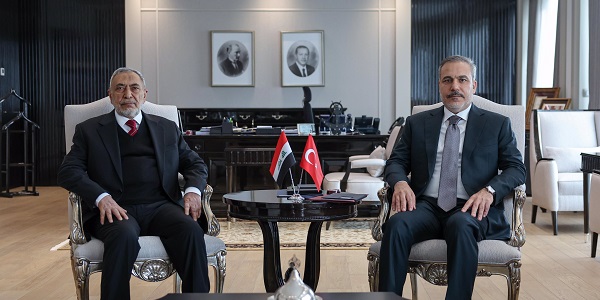Turkish Foreign Minister Hakan Fidan met his Russian counterpart Sergey Lavrov in Ankara on Monday, the three-year anniversary of the Russian invasion of Ukraine, to discuss issues ranging from the conflict to Turkey's aspirations for EU and BRICS membership.
At a joint press conference after the meeting, Fidan said that negotiations on Turkey's EU membership had "de facto stalled" because of the bloc's "Islamophobic" view.
NATO member Turkey became a candidate for EU membership in 1999 and started membership negotiations in 2005. In 2018, however, its efforts stalled due to the country's retreat from democracy and the erosion of the rule of law under President Recep Tayyip Erdoganas well as disputes with EU member Cyprus.
"With the European Union right next door, which is highly institutionalised, we have a long-term adventure of membership," Fidan said.
"At some point the membership negotiations froze because the European Union, because of its identity politics, did not feel willing to accept a large Muslim country into its ranks. Nobody says it openly, but that's the situation," He added. On the issue of cooperation with the BRICS group of emerging economies (Brazil, Russia, India, China, South Africa, Ethiopia, Iran, Egypt and the United Arab Emirates), Fidan stressed the importance of Turkey's presence in various forums to consolidate its place in the global economic order.
Turkey applied to join the group, which is chaired by Russia, as a full member last year with the stated aim of "simultaneously" strengthening its ties with both East and West, but Fidan said it was not offered membership.
"We are watching BRICS closely, we have clearly expressed interest, but as far as we know, BRICS has frozen recruitment of new members to complete its own institutionalization," He said. "We were not offered membership. That is why we continue to monitor developments closely."
Fidan praised BRICS compared to the EU: "Unlike the European Union, the composition of BRICS is very inclusive. When we see countries of all skin colours, religions, cultures and civilisations coming together ... Whatever the people and civilisations are, they are trying to create a platform here. I hope that an institutionalised and inclusive economic approach will also develop here."
Last September, Fidan said Turkey would not seek BRICS membership if the country gained EU membership.
Turkey sees BRICS as an opportunity to strengthen economic cooperation with member states and its officials have stressed that possible membership would not affect the country's obligations to NATO or ties with Western countries.
Erdogan, who has been in power for more than 20 years, is seeking a more independent foreign policy for Turkey and a strengthening of its global influence.
euronews/ gnews.cz - RoZ
PHOTO - mfa.gov.tr



